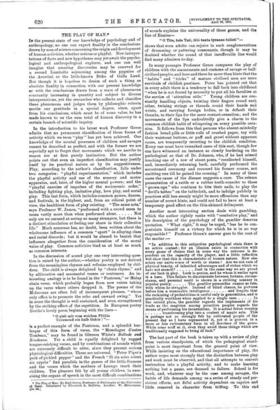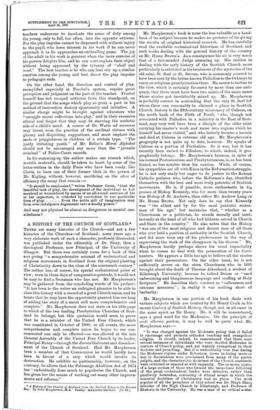THE PLAY OF MAN.* IN the present state of our
knowledge of psychology and of anthropology, no one can expect finality in the conclusions drawn by men of science concerning the origin and development of human activities, whether serious or playful. New interpre- tations of facts and new hypotheses may yet await the psycho- logical and anthropological explorer, and one can well imagine that amazing discoveries may be reserved for a second Lumholtz sojourning among the pygmies of the Ara wimi or the little-known Doko of Galls. Land. But though it is hopeless to dream of such a thing as absolute finality in connection with our present knowledge or with the conclusions drawn from a mass of phenomena constantly increasing in quantity and subject to diverse interpretations, yet the researcher who collects and classifies these phenomena and judges them by philosophic criteria merits our gratitude in a special degree, since, apart from his conclusions, which must be of some value, he has made known to us the sum total of human discovery in a certain branch of scientific inquiry.
In the introduction to his latest work Professor Gross admits that no permanent classification of those forms of activity which we term " play " has yet been achieved. Our knowledge of the mental processes of children and savages cannot be described as perfect, and with the former we are especially apt to forget that movements which we ascribe to reason are at first purely instinctive. But the author points out that even an imperfect classification may justify itself by its practical nature or by its suggestiveness. Play, according to the author's classification, falls under two categories : "playful experimentation," which includes the playful activity and use of the sensory and motor apparatus, and, later, of the higher mental powers ; and the "playful exercise of impulses of the socionomic order," including fighting play, imitative play, love play, and social play. This last form, which includes common games, dances, and festivals, is the highest, and, from an ethical point of view, the healthiest form of play existing. "The same acts," says Professor W. James, "performed with a crowd seem to mean vastly more than when performed alone Not only are we amused at seeing so many strangers, but there is a distinct stimulation at feeling our share in their collective life." Much nonsense has, no doubt, been written about the wholesome influence of a common "sport" in allaying class and racial discords ; but it would be absurd to banish that influence altogether from the consideration of the moral value of play. Common activities bind us at least as much as common interests.
In the discussion of sound play one very interesting ques- tion is raised by the author,—whether poetry is not derived from the meaningless rhymes and refrains employed by chil- dren. The child is always delighted by "chain rhyme," and by alliterative and assonantal verses or sentences. An in- teresting analogy is to be found in the " Pantoum," or Malay chain verse, which probably began from new voices taking up the verse where others dropped it. The poems of the Moluccans are often full of inconsequent phrases, "whose only office is to promote the echo and onward swing." Yet in some the thought is well sustained, and even strengthened by the striking effect of the repetition. In European poetry Goethe's lovely poem, beginning with the lines-
" 0 srieb mir vom weichen Pflihle Triumend em n halb Gehtir ! "- Is a perfect example of the Pantoum, and a splendid bur- lesque of this form of verse, the "Monologue d'outre Tombeau," may be found in Gleeson White's Ballads and Bandeaux.. Yet a child is equally delighted by ragged tongue-catching verses, and by combinations of sounds which are extremely difficult to utter, since they present serious physiological difficulties. These are universal. "Peter Piper's peck of pickled pepper" and the French "Si six scies scient six cyprea " find parallels in the games of the little Siamese and the verses which the mothers of Loango teach their children. The pleasure felt by all young children in exer- cising the organs of speech in the most difficult combinations • The Play of Man: By Karl Grecs, Professor of Philosophy at the University of Basel. Translated by Elizabeth L. Baldwin. London: W. Heisemann.
of sounds explains the universality of these games, and the line of Ennius- " 0 Tile, bate Tati, tibi tents tyranne tnlisti"— shows that even adults can rejoice in such conglomerations of drumming or pattering consonants, though it may be doubted whether the sound of that insufferable line would find many admirers to-day.
In many passages Professor Groos compares the play of children with the amusements and customs of savage or half- civilised peoples, and here and there he more than hints that the " habits " and " tricks " of mature civilised men are mere survivals of childish pastimes. Perez has pointed out that in every adult there is a tendency to fall back into childhood "when he is not forced by necessity to put all his faculties at the service of attention utile.' " Young children are con- stantly handling objects, twisting their fingers round each other, twining strings or threads round their hands and wrists, and carrying foreign bodies, or in default their thumbs, to their lips for the mere contact-sensation; and the movements of the lips undoubtedly give a charm to the common childish habit of whispering on every possible occa- sion. It follows from this that persons who absent-mindedly
fashion bread pills or little rolls of crushed paper, toy, with
their waistcoat buttons, or puff and growl without apparent cause, are temporarily reverting to the childish condition. Every one must have remarked cases of this sort, though few can have witnessed an instance so closely bordering on the pathological as that of Dr. Johnson, who, if he had missed touching one of a row of street posts, "recollected himself, and, immediately returning back, carefully performed the accustomed ceremony and resumed his former course, not omitting one till he gained the crossing." In many of these cases the cause of the disease suggests a cure. The solemn presentation of a rattle or a rubber tooth-consoler to those "grown-ups." who continue to bite their nails, to play the " tattoo" on the tablecloth, and to indulge publicly in practices still less seemly might be more efficacious than any number of covert hints, and could not fail to have at least a temporary good effect on the thin-skinned delinquent.
Another most interesting section deals with gambling, which the author rightly ranks with "combative play," and his description of the psychology of the gambler deserves quotation. "What right," it may be urged, "has he to con- gratulate himself on a victory for which he is in no way responsible ? " Professor Groos's answer goes to the root of the matter In addition to this subjective psychological state there is an active contest ; for an illusion exists in connection with every game of chance that in some way the outcome is de- pendent on the capacity of the player, and a little reflection will show that this is characteristic of human nature. How else arises our naive sense of worth or shame ? Are we not vain of physical beauty, of inherited advantages and of riches which we have not earned ? Just in the same way we are proud' of our luck in play. Luck is genius, and be whom it smiles upon. is a hero. This failure to discriminate between fortune, circum-• stance, and personal merit is shown in a striking manner in
popular poetry The gambler personifies chance as fate, with whom he struggles. Instead of blind chance, he pictures before him a reasonable intelligence . . . . . . and forgets that the reckoning of probabilities is useful only in generalities, and is practically worthless when applied to a single case In the second place, the gambler regards the implements of his trade as the magician among primitive peoples regards the means of performing his incantations, It is actual fetish worship transforming play into a contest of magic arts. This' is perhaps not so strongly felt by cultivated people of the present day as I have represented it, yet it is present in a more or less rudimentary form in all devotees of the game. While some scoff at it, even they avoid those things which are traditionally supposed to bring ill luck."
The last part of the book is taken up with a review of play from various standpoints, of which the pedagogical stand-
point is most important from the general point of view. While insisting on the educational importance of play, the author urges most strongly that the distinction between play and work must be observed, and that all attempts to convert
instruction into a playful activity, and to make learning nothing but a game, are doomed to failure. School is for work, and, whatever may be the case among savages, the battle of life demands among us a series of steady and per- sistent efforts, not fitful activity dependent on caprice and little removed in character -from trifling. To this e,hd
teachers endeavour to inculcate the sense of duty among the young, only to fall, too often, into the opposite extreme. For the play impulse cannot be dispensed with without injury to the pupil, who loses interest in his work if he can never
approach it as he approaches an enthralling game. The joy of the adult in his work is greatest when the mere exercise of his powers delights him, and he can contemplate their object without being oppressed by the tyranny of "shall and must." The best teacher is he who can best stir up a similar emotion among the young, and best direct the play impulse to pedagogic ends.
On the other hand, the direction and control of play, exemplified especially in Froebers system, require great perception and judgment on the part of the teacher. Froebel himself has not escaped criticism from this standpoint, on the ground that the songs which play so great a part in his method of instruction destroy spontaneity and initiative. A similar charge might be brought against educators who "smuggle moral reflections into play," and in their excessive
ethical zeal forget that they may be starving the mothetic side of a child's mind. A course of Dr. Watts ad nauseam
may invest even the practice of the cardinal virtues with gloomy and dispiriting suggestions, and must implant the seeds of priggishness in children of a certain type. "The
justly irritating youth" of Mr. Belloc's Moral Alphabet should not be encouraged any more than the "juvenile
criminal" of Police-Court records.
In his summing-up the author makes one remark which, mutatis mutandis, should be taken to heart by some of the letter-writers in the daily Press who have been ready, like
Clovis, to burn one of their former idols in the person of Mr. Kipling, without, however, sacrificing on the altar of efficiency the many that remain :—
"lb should be emphasised." writes Professor Groos, "that the beautiful task of play, the development of the individual to full manhood or womanhood by means of an all-round exercise of his or her capacities, is retarded by restriction to one particular
form of play Even the noble gift of imagination may from over-indulgence degenerate into a deadly poison."
And may not physical be almost as dangerous as mental one- sidedness ?



























































 Previous page
Previous page